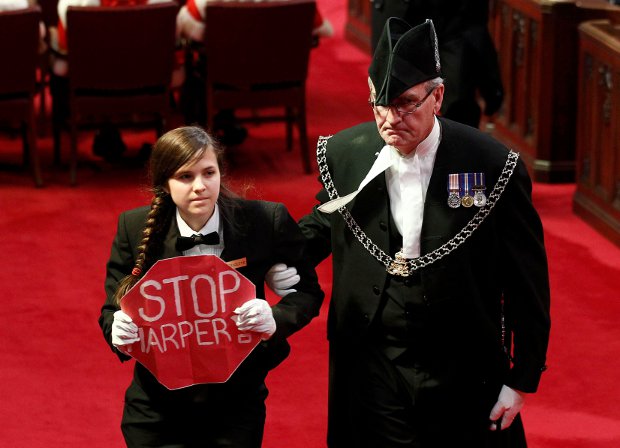
Brigette DePape is escorted from the Senate during her protest in last June’s Speech from the Throne
Former Senate page Brigette DePape’s silent “Stop Harper” protest on the floor of the Canadian Senate during the June 3, 2011 Speech from the Throne eclipsed the speech itself everywhere it was reported. One of the first organizations to respond to DePape’s gesture was The Council of Canadians. The Council’s chair, Maude Barlow, contacted DePape on June 4, offered her solidarity, as well as the Council’s support for DePape’s report: Thinking Outside the Ballot Box: How People Power Can Stop the Harper Agenda and Create Fundamental Change.
In the Introduction to Thinking Outside the Ballot Box, DePape expresses her gratitude to “the thousands of people who were excited by my action. It shows that people in Canada are burning for change” (3). Throughout the twenty-four page report, DePape draws upon her own experience and the experience of others to suggest how and why “people power” can change for the better the way Canada is governed (5). She cites former Governor-General Ed Broadbent, who, in response to DePape’s protest, likewise advocates the principle of people as a legitimate form of resistance to unfair and inequitable government policies: “What is the real offence,” Broadbent asks, “silently watching growing injustice, or upsetting the sensibilities of those who should be doing something about it?” (9).
“People power” is a more restrained rallying cry than “power to the people,” and yet DePape’s confidence in it is unshakable. “People power rises from the bottom-up,” DePape suggests, and goes on to observe that “people are more powerful when they. . . remove their consent.” Those who possess power, consequently, “become powerless, and power shifts to those” from whom all power proceeds, the people themselves (5).
DePape maintains that “collective indignation is a first step in building a movement to stop injustice,” and asks us to “imagine the movement we can build if we use our collective indignation to create the Canada we want” (10-11). DePape reminds us that “[d]emocracy is not just about voting every four years,” and asks that those who dissent to join together in protest against the inequitable policies of the Harper government (7).
On November 1, DePape was guest speaker at a Peterborough-Kawarthas chapter of the Council of Canadians event, “Stop Harper: the Arts, Youth, and the Future of Canada.” Sara Ostrowska reported in Trent University’s student newspaper:
There were over 100 people in attendance, of all ages and walks of life, but everyone had one thing in common: they were inspired by Brigette DePape’s small act of civil disobedience.
Near the end of the presentation, an older woman in the audience shouted, “Hey hey, ho ho, Stephen Harper must go,” and the chant broke out, with DePape joining in.
The second chapter of Thinking Outside the Ballot Box is “Democracy Is More Than Just A Ballot Box” (7), which nicely echoes Northrop Frye in “The Analogy of Democracy”: “Law is the expression of temporal authority; justice is law informed by freedom and equality” (CW 176). This is something we must keep in mind every day as citizens of a democracy. The law requires that we recognize that Stephen Harper is, by way of the ballot box, our properly elected prime minister, and as such he has the legal right to govern. However, justice requires that we resist the policies we believe to be unfair, inequitable, unjust as an expression of the people power which is the first and last authority of any democracy.

On 2 Nov 2011, Dean Del Mastro, Conservative MP for Peterborough and Parliamentary Secretary to the Prime Minister, posted this comment on Facebook:
“Here’s irony, of all the places that the Council of Canadians (read NDP) could host Bridgette Depape in Peterborough they choose the Market Hall Theatre. Yes that’s right the same Market Hall theatre that our economic action plan paid to renovate. Is that the corporate agenda of the government on display? What nonsense.”
http://tinyurl.com/btvrnkj
Thanks for this, Veronica. Yes, justice requires that we raise our voices, as you say, and sometimes I am naive enough to think we have to right to do so in a democratic country, but now I am really beginning to wonder.
What is happening right now in North America is appalling, and perhaps most appalling is the complacency of a media that seems too cowed or dim to recognize that the protests in Egypt and the Middle East and the protests here are driven by the same outcry, mostly by the youth of this new generation, against the same despicable social and economic injustices. But how can one not make the connection between the actions of the police and military against the people in Egypt and Syria and the police actions against the people here and in the United States, especially because it is so explicit at a visual level if you’re watching it on television. How could one not connect the dots? Not to mention the uncovering of the role played by the police in the G20 actions and of the unjustifiable nature of what really amounts to massive numbers of illegal arrests and incarceration. The injustices of the G20 seem to have only one effect on the regimes here and in the States: to keep perpetrating the same injustices. It is almost as if our governments here are taking their cue from the regimes in the Middle East. Monkey see, monkey do.